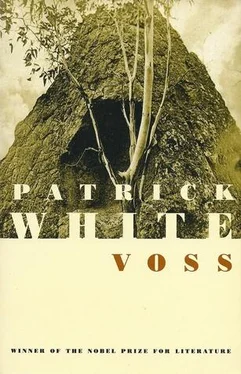‘In this treacherous wind.’
With that wretched man.
She half-arranged an invisible shawl as a protection against her own distress in such a situation.
‘Miss Hollier particularly wants to hear you play the Field nocturne, the one with the pretty tune towards the end, you know, that I so much like.’
They went into the rosy room, where Uncle had built his hands into a gable, and was explaining to Mr Palfreyman, whose eyeballs had grit behind them, the dangerous hold the sectarians, not to say Roman Catholics, already had upon the Colony. It was strange that things spiritual should make Mr Bonner’s flesh swell.
Laura Trevelyan immediately sat down at the piano, and gave rather a flat rendering of the Field nocturne.
The German, who had followed the ladies into the room, stood biting his lips, unconscious of the awkward, even embarrassing attitude of his body, listening, or so it appeared, as if the music propounded some idea above the level of its agreeable mediocrity. Then he went and flung himself down, boorishly, Miss Hollier remarked afterwards to a friend, flung himself upon an upright sofa that did not respond to him. He sat or sprawled there, passing his hand intermittently over his forehead and his closed eyes, and remained more or less oblivious after Laura had left the piano.
So he spent what remained of the evening. He himself could not have told exactly of what he was thinking. He would have liked to give, what he was not sure, if he had been able, if he had not destroyed this himself with deliberate ruthlessness in the beginning. In its absence there remained, in the lit room, a shimmering of music, and of the immense distances towards which he already trudged.
THE morning Johann Ulrich Voss and his party were due to sail to Newcastle on the first stage of their attempt to cross the continent, a fair number of friends and inquisitive strangers was converging on the Circular Wharf. It was a still, glassy morning, from which the wind had but recently fallen after blowing almost continuously for three whole days. It would rise again, however, said those who knew instinctively of such things; it would rise later that afternoon, and more than likely take the Osprey out.
So there was a quiet conviction of preparation in the lovely morning, although at sight of green water lolling round the sides of ships and little blunt boats, all belief in oceans should have been suspended. Life was grown humane. No one would be crucified on any such amiable trees as those pressed along the northern shore. On all sides of the landscape there was evident at present a passionless beauty that recurred even in the works of men. Houses were honester, more genial, it seemed, in the crude attempt to fulfil their purpose. Then, there was the long, lean ship, smelling of fresh tar, of hemp, of salt, and a cargo of seed potatoes with the earth still on them. This ship that would carry the party on the first and gentle lap of their immense journey, and which had been evolved by some most happy conjunction of art and science, could never have known conflict of canvas, or so it appeared.
Most tackle had already been conveyed aboard, either the previous evening, or early on the present day, before the drunkards had begun to stir on the ruts of the streets, while cows with full udders were still filing towards the fringes of the town. The stars were not yet gone when Voss stuck his head into his cold shirt. His skin was soon taut. His light-coloured eyes, which were often surprisingly communicative to simple people, had made Mrs Thompson cry as she stood in her nightgown at the leave-taking, though, of course, as on all such occasions, she was remembering the dead. Topp, in nightcap, still puffy, and also moved, shook his lodger by the hand, but would come at the last, he insisted, to the ship’s side. Then Voss climbed upon the cart of an Irish emancipist, and was driven to the water. The straggly grass, wherever the town had not suppressed it, was full of dew.
All that morning Voss was coming and going at the ship. Some spoke to him as he passed, asked for directions, asked to be commanded. Some did not see him, but took him for granted. He was there, the leader. He had grown thinner overnight from thinking of the future. From all angles, this was so immense, he would suddenly grow exasperated and turn his back on those of his followers who were simple enough to expect explanations. It puzzled those honest people. Others would catch sight of his head and shoulders as he disappeared below deck, and feel relieved, because they were unable to resolve their relationship with such a man, yet even these were glad of his presence, unseen and hateful though he was. Others still were racked by the spasms of a jealous love.
Harry Robarts, who had got there earliest after his leader, to be ignored, would have felt lost in that perfect but oblivious scene, if later that morning he had not caught sight of Mr Palfreyman, the ornithologist, who was attempting to bring on board a number of awkward specimen cases, that a cynical carter had dumped upon the wharf and left. This kind of situation would rouse Harry’s gratitude and ardour. Only when serving was he purposeful.
So he came down, as quick as his boots would let him, his simple soul open to receive the superior will of whatever master. He touched his cap, and rather jerkily, said:
‘Why, Mr Palfreyman, sir, I will lend a hand with these ’ere articles, if you is agreeable. It passes the time to be of use, when it is all strange, like.’
Some would have taken Harry Robarts for servile. He had been sworn at, in fact, by certain individuals of that town. But the only concession made to the judgement of his critics was in the mottling and deepening of his skin, now a clear bronze, that had once been innocent pink. Otherwise, the lad continued to give of himself without shame, because it was in his nature to.
‘Yes, well, thank you, Harry. It is civil of you. If you please,’ said the ornithologist, who was taken by surprise.
The latter was, after all, a stiff, insignificant man, it appeared. Certainly, if there were no reason why he should assert himself, he might go whole days without being noticed. During the recent interval of preparation and expectation he had withdrawn to his own thoughts, and was only now emerging, as ropes were being freed, the voices of sailors calling to one another, wagons backing, landsmen swearing, bodies sweating. His grey eyes were now looking about him, and at the boxes which the boy proposed to lift. One of the man’s cheeks twitched, but once, and very shadowily.
‘These are most impracticable cases for muleback, but I am taking them because, in other ways, they suit my purpose. Do you see, Harry?’
‘Yes, sir,’ said the boy.
He did not, but felt that he was being drawn into some confidence which was good and warm, and which promised contentment for the future.
Or was this wrong?
The boy looked over his shoulder, but did not see anyone. He had been guilty of a lapse, he suspected, in enjoying those moments of warm fellowship in the sun. Somewhere he had learnt that man’s first duty is to suffer.
The gentlemen, however, appeared to be ignorant of that lesson, as he bent over his cases, opened their flaps, and explained certain advantages of their design, which was his own, he suggested, smiling.
‘And these sections are for the skins which I shall prepare,’ Mr Palfreyman was saying; ‘and these little compartments for the specimens of eggs. Where are you from, boy?’ he asked.
The lad did not answer. He could have been absorbed.
‘You are not from London,’ the ornithologist pondered.
Then Harry Robarts began to mumble.
‘From thereabouts,’ he said.
As if it mattered. Now the blue sky was hateful.
Читать дальше












